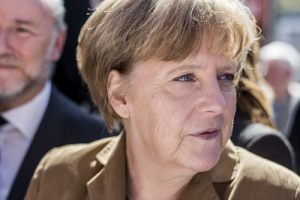RefugeesMerkel: Germany will “drastically reduce” number of refugees arriving in Germany
German chancellor Angela Merkel said Sunday that she wanted to “drastically decrease” the number of refugees coming to Germany, indicating she would willing to compromise with critics within her own conservative party, the Christian Democratic Union (CDU). These critics have charged that her open-door policy posed security risks to Germany and would expand the government welfare rolls.

German Chancellor Angela Merkel, currently under seige // Source: commons.wikimedia.org
German chancellor Angela Merkel said Sunday that she wanted to “drastically decrease” the number of refugees coming to Germany, indicating she would willing to compromise with critics within her own conservative party, the Christian Democratic Union (CDU). These critics have charged that her open-door policy posed security risks to Germany and would expand the government welfare rolls.
The Independent reports that Merkel, however, has rejected calls from these critics to put a cap on the number of refugees entering Germany.
“At the same time we took on board the concerns of the people, who are worried about the future, and this means we want to reduce, we want to drastically decrease the number of people coming to us,” Merkel told broadcaster ARD on Sunday.
Germany estimates that about 340,000 refugees will have been accepted by the end of the year.
Merkel, who is attending the CDU’s annual congress in the southern city of Karlsruhe, insisted that the word “limit” did not appear in the CDU’s main resolution, which will be debated at the two-day party congress.
The chancellor outlined her strategy to reduce the number of refugees arriving in Germany: working with Turkey to fight traffickers, improving the situation at Syrian refugee camps in Turkey, Lebanon and Jordan, and strengthening control of the EU’s outer borders.
Merkel’s conservative party critics also have political considerations. Merkel’s refugee policy has seen her personal favorability numbers – and those of the CDU – plummet, and the critics want her government to show that the number of refugees arriving in Germany is going down, and do so before the March state elections. Merkel hopes to run for a fourth term in 2017, but a bas showing for the CDU in the March state elections would embolden party rivals to challenge her.
Merkel was hoping to find an EU-wide solution to the refugee crisis, a plan which would include a quota of refugee each of the EU’s twenty-eight member states, based on the state’s population and GDP, would have to take. Southern and East European EU members have resisted the mandatory quota, however, and the plan has stalled.
A key point her critics make is that in August, when it was clear that the quota plan was not going to pass, she allowed Syrian asylum seekers to remain in Germany while their application s were being processed, although she had earlier claimed that these refugees would be moved to other EU countries once the quota plan has been agreed upon.
